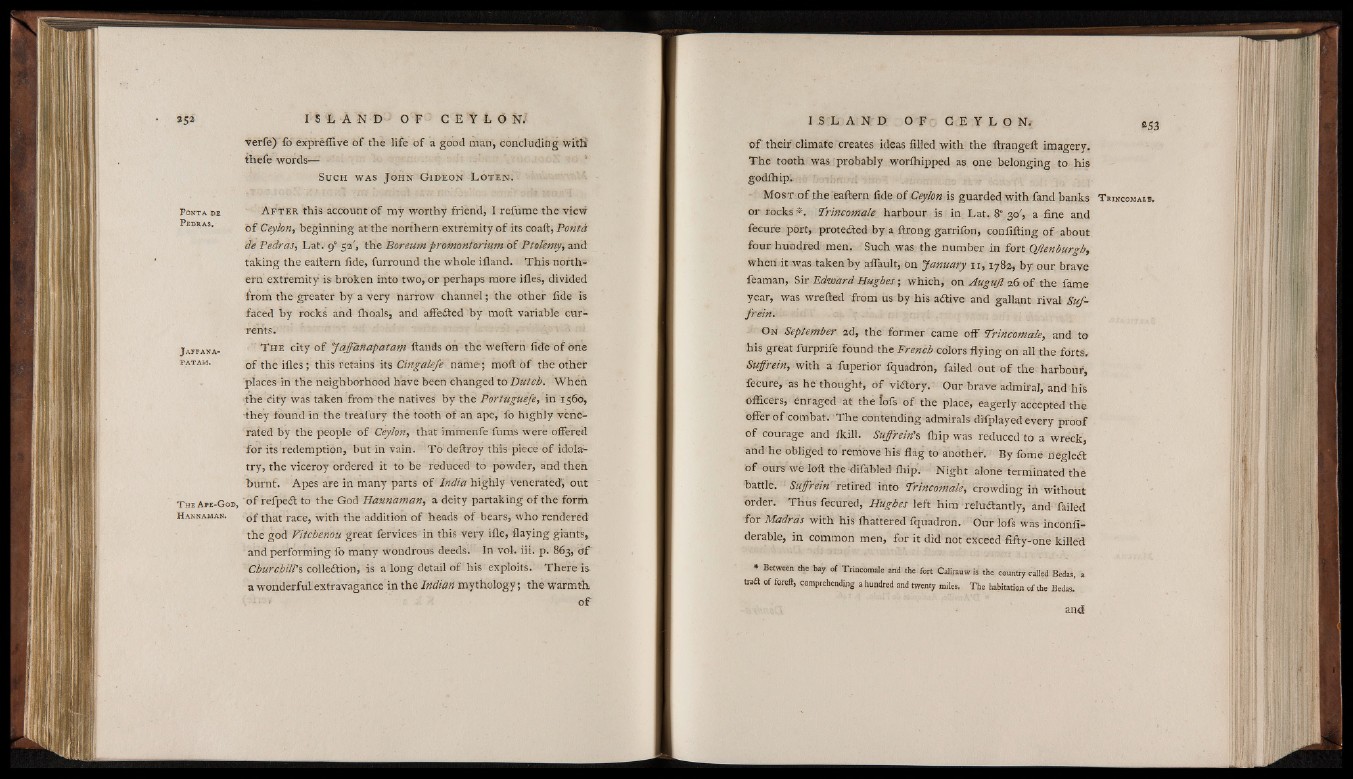
verfe) fo exprefiive of the life of a good man, concluding with
theie words—
S u c h w a s J o h n G io e o n L o t e n .
PONTA DE
PeDXAS.
J af fa n a -
TATAM.
A f t e r this account of my worthy friend, I refume the view
o f Ceylon, beginning at the northern extremity of its coaft, Pont à
de Pedras, Lat. 9° 52', the Boreum promontorturn of Ptolemy, and
taking the eaftern fide, furround the whole ifland. This northern
extremity is broken into two, or perhaps more iiles, divided
from the greater by a very narrow channel ; the other fide is
faced by rocks and ihaals, and affeiled by moft variable currents'.
T h e city o f Jaffanapatam Hands on the weftern fide of One
of thé iiles ; this retains its Cingalefe nàmè; moft Of the other
places in the neighborhood have been changed to Dutch. When
the city was taken from the natives by the Portüguêfe, in 1560,
•they found in the treafury thé tooth o f an ape, fo highly venerated
by the people of Ceylon, that immenfe fums were offered
for its redemption, but in vain. To deftroy this piece of idolai-
try, the viceroy ordered it to be reduced to powder, and then
burnt. Apes are in many parts of India highly veneratèd, out
T he A pe-G od, 'o f refpea to the God Hannaman, a deity partaking o f the form
o f that race, with the addition of heads of bears, who rendered
the god Vitcbenou great fervices in this very ifle, flaying giants,,
and performing ib many wondrous deeds. In vol. iii. p. 863, of
Churchill's collection, is a long detail of his exploits. There is
a wonderfuLextravagance in the Indian mythology; the warmth.
o f
H annaman.
o f their climate creates ideas filled with the ftrangeft imagery.
The tooth was probably worihipped as one belonging to his
godlhip.
M o s t of the eaftern fide o f Ceylon is guarded with fand banks
or rocks*. Trincomale harbour is in Lat. 8° 30', a fine and
fecure port, protected by a ftrong garrifon, eonfifting o f about
four hundred men. Such was the number in fort OJlenburgh,
when it was taken by affault, On January 11,1782, by our brave
feaman, Sir Edward Hughes ; which, on Augujl 26 o f the fame
year, was wrefted from us by his aCtive and gallant rival Suf-
frein.
O n September 2d, the former came off Trincomale, and to
his great furprife found the French colors flying on all the forts.
Suffrein, with a fuperior iquadron, failed out o f the harbour,
fecure, -as he thought, o f viaory. Our brave admiral, and his
officers, énraged at the îofs o f the place, eagerly accepted the
offer o f combat. The contending-admirals diflplayed every proof
o f courage and ikill. Sujjrein's ihip was reduced to a wreck,
and he obliged to remove his flag to another. By fomé rieglea
o f ours we loft the difabled ihip. Night alone terminated the
battle. Suffrein retired into Trincomale, crowding in without
order. Thus fecured, Hughes left him reluctantly, and failed
for Madras with his ihattered fquadron. Our lofs was inconfi-
derable, in common men, for it did not exceed fifty-one killed
* Between the bay of Trincomale and the fort Caliranw is the country called Bedas, a
traa of foreft, comprehending a hundred and twenty miles. The habitation of the Bedas.
and
T RINCOMALE,